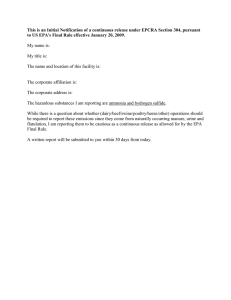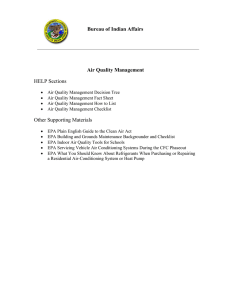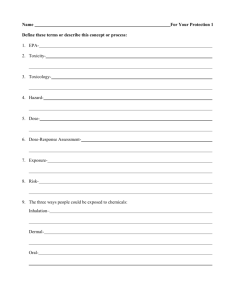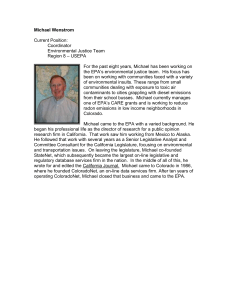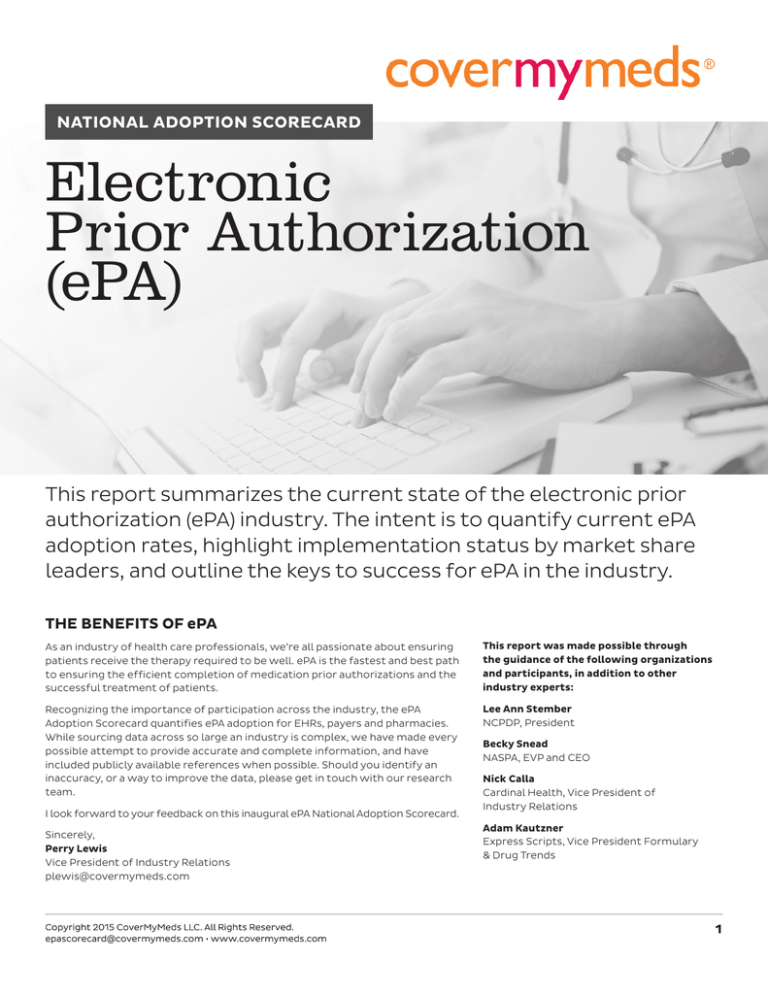
NATIONAL ADOPTION SCORECARD
Electronic
Prior Authorization
(ePA)
This report summarizes the current state of the electronic prior
authorization (ePA) industry. The intent is to quantify current ePA
adoption rates, highlight implementation status by market share
leaders, and outline the keys to success for ePA in the industry.
THE BENEFITS OF ePA
As an industry of health care professionals, we’re all passionate about ensuring
patients receive the therapy required to be well. ePA is the fastest and best path
to ensuring the efficient completion of medication prior authorizations and the
successful treatment of patients.
This report was made possible through
the guidance of the following organizations
and participants, in addition to other
industry experts:
Recognizing the importance of participation across the industry, the ePA
Adoption Scorecard quantifies ePA adoption for EHRs, payers and pharmacies.
While sourcing data across so large an industry is complex, we have made every
possible attempt to provide accurate and complete information, and have
included publicly available references when possible. Should you identify an
inaccuracy, or a way to improve the data, please get in touch with our research
team.
Lee Ann Stember
NCPDP, President
I look forward to your feedback on this inaugural ePA National Adoption Scorecard.
Sincerely,
Perry Lewis
Vice President of Industry Relations
plewis@covermymeds.com
Copyright 2015 CoverMyMeds LLC. All Rights Reserved.
epascorecard@covermymeds.com • www.covermymeds.com
Becky Snead
NASPA, EVP and CEO
Nick Calla
Cardinal Health, Vice President of
Industry Relations
Adam Kautzner
Express Scripts, Vice President Formulary
& Drug Trends
1
NATIONAL ADOPTION SCORECARD
A NOTE FROM LEE ANN STEMBER,
PRESIDENT OF NCPDP
ELECTRONIC PRIOR AUTHORIZATION (ePA)
NCPDP is an exceptionally innovative, member-driven, multistakeholder problem solving organization. Our ANSI-accredited
standards and industry guidance have transformed health care
by providing interoperable industry standards and actionable
guidance on patient safety issues.
The change we need right now – to support the movement
of data for proactive point of care interventions - will take a
concerted effort on the part of every industry stakeholder
group. We must adopt and implement the full functionality
inherent in industry standards to improve health outcomes,
reduce unnecessary costs and make health care safer. We
applaud all efforts that work toward that end.
This year we were pleased to welcome CoverMyMeds as
our Inaugural Partner in the NCPDP Elite Partner Program.
CoverMyMeds has demonstrated its deep and ongoing
commitment to supporting the work of NCPDP – the work
of all our members – as an Elite Partner. We are proud of
this unique relationship and CoverMyMeds’ commitment
to supporting the adoption and implementation of industry
standards – including electronic prior authorization in the
NCPDP SCRIPT Standard.
The electronic prior authorization (ePA) transactions are
available in the NCPDP SCRIPT Standard, which provides the
essential framework for transmitting prescription information
electronically – from new prescriptions and changing
existing prescriptions, to refills and cancellations, fill status
notifications, medication history, transactions for long-term
care, and more.
The SCRIPT Standard is part of a standards ecosystem that
enables the exchange of clinical and financial data within care
providers’ workflows to support better quality patient care
and reduce costs. When combined with the Formulary and
Benefit Standard, we drive even deeper into achieving the
triple aim of improving the U.S. health care system – making
a patient’s formulary and benefit information available at
the point of prescribing, providing an automated process for
managing an electronic prior authorization, if required, and
helping to increase compliance with treatment regimens and
improve health outcomes.
We thank NCPDP Inaugural Elite Partner, CoverMyMeds, for
supporting industry-wide adoption of NCPDP Standards and
also bringing the value of electronic prior authorization to the
forefront.
Copyright 2015 CoverMyMeds LLC. All Rights Reserved.
epascorecard@covermymeds.com • www.covermymeds.com
2
NATIONAL ADOPTION SCORECARD
ELECTRONIC PRIOR AUTHORIZATION (ePA)
Introduction
THE PRIOR AUTHORIZATION PROBLEM
Prior authorization (PA) was implemented years ago to provide
the most appropriate and cost-effective health care services.
While well-intended, the traditional paper PA process results in
an enormous amount of administrative waste and, ultimately,
prescription abandonment. For example:
PA costs the industry billions of dollars annually, across
all constituents.
• More than half of prescribers indicate they, along with their
staff, spend more than 20 hours per week on PAs.
• 40% of PAs are abandoned due to complex policies and
procedures.
• Despite these problems, the need to manage appropriate
utilization of prescription drugs continues to increase,
causing the volume of PAs to increase every year.
THE ELECTRONIC PRIOR AUTHORIZATION SOLUTION
Electronic prior authorization (ePA) connects all participants to
provide real-time information for the PA decision-making process.
As a best practice, ePA may be completed prospectively –
by the prescriber during the E-Prescribing process – and
retrospectively – following a rejection at the pharmacy.
Implemented prospectively with real-time auto-determination
from the payer, the prior authorization process begins to look
more like decision support for electronic prescribing.
That said, the prospective process requires EHR and payer
implementations. As demonstrated in the EHR and payer
sections of this report, the industry has progress to make
in implementing a prospective ePA solution and making it
accessible to prescribers.
Today, many PAs start after a claim rejection in the
pharmacy, so there is a significant role for pharmacies to play
while data and adoption challenges are worked through in
the prospective PA process. As a result, the best practice for
pharmacies is to initiate the ePA through connectivity in the
pharmacy management system.
The result of ePA is a more efficient health care process, and
ultimately healthier patients that are getting the medications
they need to live healthier lives.
ePA NATIONAL ADOPTION SCORECARD
This scorecard was developed to communicate the current status of ePA
in the industry, highlight trends, and indicate what is required to achieve
success in industry-wide ePA adoption. It was developed in collaboration
with an advisory board of industry experts. Those participating are listed
at the top of the scorecard and we personally want to thank them for
their efforts, time, edits and recommendations throughout this process.
Copyright 2015 CoverMyMeds LLC. All Rights Reserved.
epascorecard@covermymeds.com • www.covermymeds.com
3
NATIONAL ADOPTION SCORECARD
ELECTRONIC PRIOR AUTHORIZATION (ePA)
About ePA
Electronic prior authorization is the automated process of exchanging prior authorization
requirements and connecting the various organizations participating in the process.
ePA PROCESS 1
Today, many PAs are completed through a manual
process that involves phone calls and faxes
between the pharmacy, prescriber and health
plan. This is an inefficient process that can lead to
prescription abandonment by the patient.
Electronic prior authorization automates this process by allowing the
prescriber to initiate the ePA within their prescribing workflow. The most
successful ePA strategies also connect the pharmacy to initiate an ePA that
was missed at the point-of-prescribing.
Nationwide, physicians
spend $31 billion annually
interacting with health plans.
Much of that cost is directly
related to prior authorization
and medication formulary
requirements. 2
The ePA process involves a 4-part transaction that enables patient-specific
and drug-specific PA criteria and a real-time approval process.
Pharmacists
spend an average
of 5 hours per
week on prior
authorizations
More than half of
prescribers indicate
that they and their
staff spend up to
20 hours per week
on PAs
1 Adapted from NCPDP SCRIPT Standard Electronic Prior Authorization Transactions Overview, August 2013
2 Health Affairs “What Does It Cost Physician Practices To Interact With Health Insurance Plans?”
Copyright 2015 CoverMyMeds LLC. All Rights Reserved.
epascorecard@covermymeds.com • www.covermymeds.com
4
NATIONAL ADOPTION SCORECARD
ELECTRONIC PRIOR AUTHORIZATION (ePA)
About ePA
PRIOR AUTHORIZATION BY SELECTED PAYERS
Rising prior authorization frequency by selected payers, 2011 vs. 2013.
Figures given are as a percentage of all claims. 4
PAYER
2011
2013
Aetna
3.5%
5.2%
Cigna
6.1%
4.7%
Health Care Service Corp.
1.7%
7.3%
Humana
5.2%
8.4%
Regence
0.4%
0.4%
UnitedHealthcare
4.9%
12.4%
Medicare
3.3%
3.4%
Recent studies indicate
265 million claims per year
are rejected. PA volume is
increasing 20%+ per year 3
Nearly 40% of PAs are
abandoned due to complex
procedures and policies 5
COVERMYMEDS USER GROWTH (2010 – 2014)
Nearly 70% of patients
encountering paper-based
PAs do not receive the original
prescription. 5
3 - CoverMyMeds Data
3 - Administration on Aging: The Next Four Decades, The Older Population in the United States: 2010 to 2050
4 - Adapted from AMA 2013.
5 - Based on a Frost & Sullivan study
Copyright 2015 CoverMyMeds LLC. All Rights Reserved.
epascorecard@covermymeds.com • www.covermymeds.com
5
NATIONAL ADOPTION SCORECARD
ELECTRONIC PRIOR AUTHORIZATION (ePA)
About ePA
ePA LEGISLATION BY STATE 6
=Mandate electronic submission,
some pending deadlines
=Require electronically available ePA
forms
=Law mandates electronic
transaction, not being enforced
=Legislation proposed
6 - Adapted from Point-of-Care Partners
Copyright 2015 CoverMyMeds LLC. All Rights Reserved.
epascorecard@covermymeds.com • www.covermymeds.com
6
NATIONAL ADOPTION SCORECARD
ELECTRONIC PRIOR AUTHORIZATION (ePA)
ePA Availability Status
by EHR Vendors
COMMITTED
% OF EHR market committed to implementing ePA, and status as of Q1 2015*
*Based on available information in the market. This report may be updated with
additional information provided by EHR vendors. Vendors can submit information to
epascorecard@covermymeds.com.
AVAILABLE
IMPLEMENTATION STATUS BY EHR AND E-PRESCRIBING VENDORS OWNING
THE MAJORITY OF THE MARKET SHARE 7
EHR
COMMITTED
AVAILABLE
LIVE
COMPLETENESS
Allscripts
AmazingCharts
athenahealth
Cerner
DrFirst
eClinicalWorks
e-MDs
Epic Systems
GE Healthcare
Greenway Health
McKesson
Meditech
NextGen Healthcare
NewCrop
Practice Fusion
ePA INSIGHT
Many of the largest E-Prescribing and EHR vendors are in the process of
implementing ePA, and some have a solution available in the market today.
Completeness of functionality – which includes supporting the pharmacyinitiated retrospective process, and having a strategy to provide all-payer
compatibility – will be important to ensuring that prescribers adopt the solution.
LIVE
KEY
Committed = The company
publicly announced they are
committed to implementing
an ePA solution.
Available = The company
and the ePA vendor
completed the integration
work required for the ePA
solution.
Live = The ePA solution is
operational in a production
environment.
EHR includes retrospective
PA functionality
EHR includes prospective
PA functionality
PAs completed through EHR
7 - Software Advice - EHR Meaningful Use Market Share Industry View 2014
7 - SK&A - Physician Office Usage of Electronic Health Records Software
Copyright 2015 CoverMyMeds LLC. All Rights Reserved.
epascorecard@covermymeds.com • www.covermymeds.com
can be submitted to any payer
7
NATIONAL ADOPTION SCORECARD
ELECTRONIC PRIOR AUTHORIZATION (ePA)
ePA Availability Status
by Payers
% of PBM/ Plan market committed to implementing ePA, and status as of Q1 2015*
COMMITTED
*Based on available information in the market. This report may be updated with additional information
provided by payers. PBMs and plans can submit information to epascorecard@covermymeds.com.
IMPLEMENTATION STATUS BY PBMS/ PAYERS OWNING THE MAJORITY OF
THE MARKET SHARE 8
PAYER
COMMITTED
AVAILABLE
LIVE
Aetna
Argus Health Systems
Catamaran
Cigna-HealthSpring
CVS/caremark
Express Scripts
EnvisionRx
Humana
Magellan Rx
MedImpact
OptumRx
PerformRx
Prime Therapeutics
US Script
Xerox
ePA INSIGHT
Many large plans and PBMs have already launched their first ePA connections.
This is great news, but payers are recognizing that more refinement of their
systems is needed to deliver on the promise of reduced administrative waste
for all participants. Key challenges include eligibility and benefit mapping,
converting existing coverage criteria to ePA transactions, and automating the
determination process to provide real-time approvals.
AVAILABLE
LIVE
KEY
Committed = The company
publicly announced they are
committed to implementing
an ePA solution.
Available = The company and
the ePA vendor completed
the integration work required
for the ePA solution.
Live = The ePA solution is
operational in a production
environment.
8 - AIS’s Pharmacy Benefit Survey
Copyright 2015 CoverMyMeds LLC. All Rights Reserved.
epascorecard@covermymeds.com • www.covermymeds.com
8
NATIONAL ADOPTION SCORECARD
ELECTRONIC PRIOR AUTHORIZATION (ePA)
ePA Availability Status
by Pharmacies
% of Pharmacy market committed to implementing ePA, and status as of Q1 2015*
COMMITTED
*Based on available information in the market. This report maybe be updated with additional
information provided by pharmacy systems. Pharmacy systems can submit information to
epascorecard@covermymeds.com.
IMPLEMENTATION STATUS BY PHARMACIES OWNING THE MAJORITY OF
MARKET SHARE 9
PHARMACY
COMMITTED
AVAILABLE
LIVE
Ahold
Bi-Lo
Costco
CVS/ caremark Speciality Pharmacy
CVS Pharmacy (Retail)
Good Neighbor Pharmacy
H-E-B
Kmart
Kroger
Medicine Shoppe International
Publix
RiteAid
Safeway/ Albertsons
Target
Walgreens
Walmart (includes Sam’s Club locations)
ePA INSIGHT
Pharmacies are ahead of the curve on implementation, which is important
to driving ePA because the prior authorization process is still usually initiated
after a claim rejection. Despite most participants’ interest in the process
moving to the point-of-prescribing, the retrospective workflow will remain a
significant channel for years as challenges with formulary data and prescriber
adoption are resolved.
AVAILABLE
LIVE
KEY
Committed = The company
publicly announced they are
committed to implementing
an ePA solution.
Available = The company and
the ePA vendor completed
the integration work required
for the ePA solution.
Live = The ePA solution is
operational in a production
environment.
9 - Drug Store News
9 - Drug Channels
Copyright 2015 CoverMyMeds LLC. All Rights Reserved.
epascorecard@covermymeds.com • www.covermymeds.com
9
NATIONAL ADOPTION SCORECARD
ELECTRONIC PRIOR AUTHORIZATION (ePA)
Key Success Factors
ePA vendors can help drive
adoption by providing open
platforms and aligning on
standards for transactions.
The following are key
success factors for vendors,
and functionality industry
participants should look for in a
solution to optimize the value
of an ePA process.
Plan Compatibility
ePA solutions will see greatest adoption when they are a “one-stop
shop” to allow prior authorizations to be submitted to any plan. Early
participants have found that prescriber adoption is dependent upon
the ePA process becoming a consistent workflow for handling all
prescriptions-not just those for a few payers.
Prospective PA
Prospective PA allows the prior authorization to be completed before
a claim rejection occurs in the pharmacy, thereby saving time and
patient disruption. To enable this, the prior authorization process must
be initiated in the E-Prescribing workflow. Implemented properly, and
combined with real-time auto-determination from the payer, the prior
authorization process begins to look more like decision support for
electronic prescribing.
Retrospective PA
The majority of PAs still occur after a claim rejection in the pharmacy.
Over time, the prior authorization process will move to the point-ofprescribing, but only as formulary data challenges are resolved so that
prescribers can adopt the prospective workflow. This process is likely
to take many years. In the meantime, ePA vendors need to provide the
ability to connect pharmacy-initiated PAs into the prescriber workflow
within the EHR system.
Financial Model
The market stands to save billions of dollars when prescribers adopt
ePA solutions at scale. Financial models that encourage ubiquity are
therefore in everyone’s interest, and a good way to do that is to provide
ePA solutions that do not charge prescribers.
Open API
Open APIs make it easier for technology teams at EHR, payer and
pharmacy systems to quickly implement ePA solutions. Documented,
standards-based ePA APIs will be a key to driving adoption in the
market.
Copyright 2015 CoverMyMeds LLC. All Rights Reserved.
epascorecard@covermymeds.com • www.covermymeds.com
10
NATIONAL ADOPTION SCORECARD
ELECTRONIC PRIOR AUTHORIZATION (ePA)
About CoverMyMeds
The leader in Electronic Prior Authorization
CoverMyMeds’ software helps physicians, pharmacists, and
their staff complete PA requests for any drug and all plans.
Our electronic prior authorization (ePA) technology integrates
with pharmacy systems, electronic health records systems
(EHRs), and payers to create the most efficient ePA strategy
for all participants.
Headquartered in Ohio, our private company is one of the
fastest growing health care technology businesses in the
United States.
For more information, visit covermymeds.com.
CoverMyMeds is an NCPDP Elite Partner and fully supports use
of the ePA transactions available in the NCPDP SCRIPT Standard.
Sources
1 - NCPDP Script Electronic Prior Authorization Transactions Overview, August 2013
http://www.ncpdp.org/NCPDP/media/pdf/NCPDP_SCRIPT_ePA_Standard.pdf
2 - Health Affairs “What Does It Cost Physician Practices To Interact With Health Insurance Plans?”
http://content.healthaffairs.org/content/28/4/w533.full.pdf+html
3 - CoverMyMeds Data
3 - Administration on Aging: The Next Four Decades, The Older Population in the United States: 2010 to 2050
http://aoa.gov/aging_statistics/future_growth/DOCS/p25-1138.pdf
4 - AMA 2013
http://www.ama-assn.org/
5 - Frost & Sullivan study: “The Impact of the Prior Authorization Process on Branded Medications: Physician Preference,
Pharmacist Efficiency and Brand Market Share”
6 - Point-of-Care Partners
http://www.pocp.com/
7 - Software Advice - EHR Meaningful Use Market Share Industry View 2014
http://www.softwareadvice.com/medical/industryview/ehr-meaningful-use-market-share-2014/
7 - SK&A - Physician Office Usage of Electronic Health Records Software
http://www.skainfo.com/health_care_market_reports/EMR_Electronic_Medical_Records.pdf
8 - AIS’s Pharmacy Benefit Survey
9 - Drug Store News
http://www.drugstorenews.com/sites/drugstorenews.com/files/042213_TopRetailersOnline.pdf
9 - Drug Channels
http://www.drugchannels.net/2013/04/the-top-50-retail-pharmacies-according.html
Copyright 2015 CoverMyMeds LLC. All Rights Reserved.
epascorecard@covermymeds.com • www.covermymeds.com
11
Copyright 2015 CoverMyMeds LLC. All Rights Reserved.
epascorecard@covermymeds.com • www.covermymeds.com

